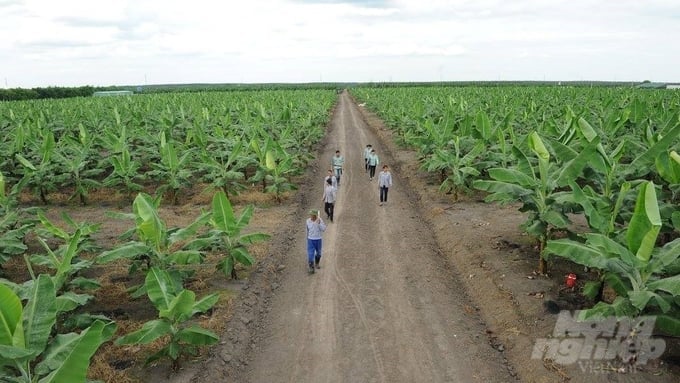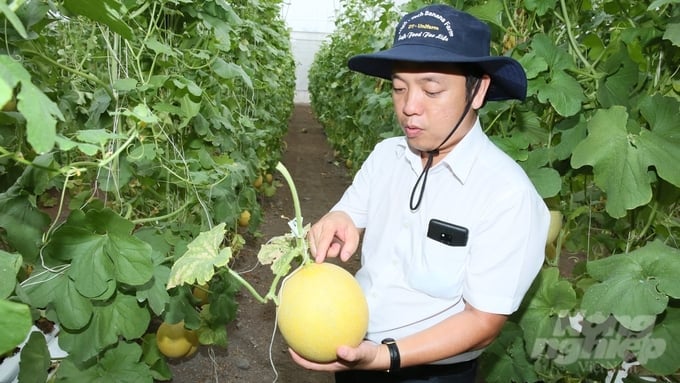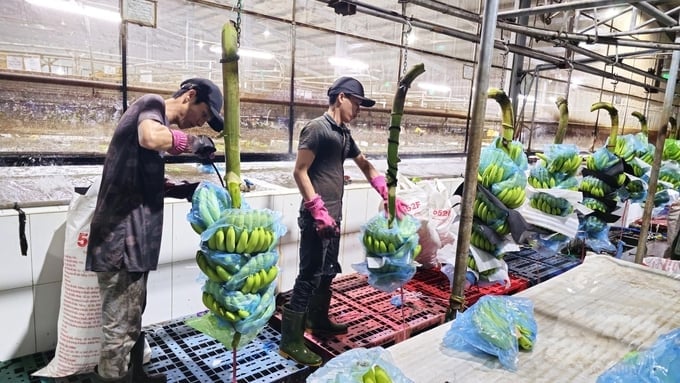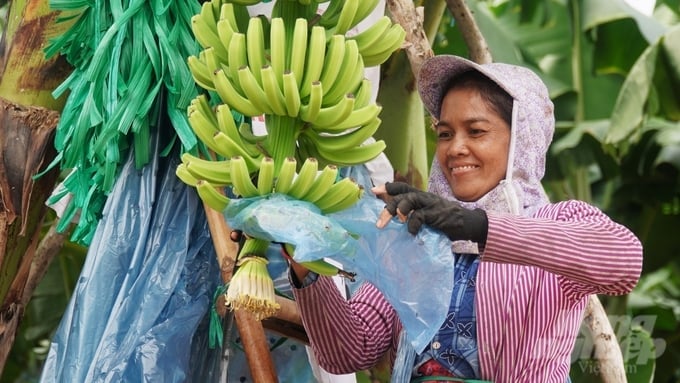December 5, 2025 | 16:43 GMT +7
December 5, 2025 | 16:43 GMT +7
Hotline: 0913.378.918
December 5, 2025 | 16:43 GMT +7
Hotline: 0913.378.918
When visiting the high-tech agricultural zone of U&I Agricultural Joint Stock Company (Unifarm), we were struck by the lush green expanse of dozens of hectares of banana plantations, complemented by modern production equipment.

In 2009, Unifarm officially began its operations on over 411 hectares in An Thai commune, Phu Giao district, Binh Duong province. Photo: Hong Thuy.
In a conversation with Mr. Pham Quoc Liem, General Director of Unifarm, he shared that the path to success was fraught with challenges. The early days were particularly tough, filled with what he described as "swallowing bitterness and pain." Yet, through perseverance and a steadfast commitment to high-tech agriculture, Unifarm has achieved remarkable results.
According to Mr. Liem, in 2008, when Binh Duong province was steering towards the development of modern agriculture with a focus on high-tech applications, Unifarm was selected as the province's pilot model. At that time, Mr. Liem convinced provincial leaders of the venture's potential, determination, and initial successes.
In 2009, Unifarm officially commenced operations on over 411 hectares in An Thai commune, Phu Giao district. The project started on a barren plot of land – nothing but wind and grass, with no infrastructure, roads, electricity, or water.
Another significant challenge was that, at the time, there needed to be effective high-tech agricultural models within the country to use as references. Unifarm had to pave its own way.

After 12 years of operation, Unifarm has transformed the entire An Thai Agricultural Zone into a thriving area of high-value crops, catering to suitable markets, and offering replicable models for local farmers. Photo: Hong Thuy.
Mr. Liem shared that when Unifarm was first established, there were only 10 members, including leaders and technical staff. The team had to split up and travel to countries with advanced agricultural sectors, such as Israel, Taiwan, and Japan, to learn about high-tech farming practices. Unifarm also brought in experts from Israel and the Philippines to provide technical guidance.
Initially, Unifarm focused on cultivating crops like bell peppers, tomatoes, melons, eggplants, and asparagus – plants that Israel had mastered in terms of world-leading productivity and quality. When Unifarm began growing these crops, they met GlobalGAP standards, qualifying the products for export. Unifarm became the first entity in the country to achieve this certification.
Tomatoes, for example, yielded up to 100 tons per hectare, which was 10 times more than traditional cultivation methods. However, the tomatoes did not meet export standards because too much emphasis was placed on yield rather than strict requirements for size and weight.
"In 2009, Unifarm invited Mr. Aviel to assess the agricultural potential in Binh Duong. Recognizing the opportunity to develop high-tech agriculture in An Thai (Phu Giao district), he decided to stay and help establish the first modern agricultural project here. He taught us the fundamentals of agriculture, from planting and preserving produce to nutritional techniques and plant protection, with a special emphasis on environmental protection. He not only required employees to maintain cleanliness in the agricultural zone but also encouraged neighboring households to participate. His passion inspired me to train to become a 'Vietnamese Aviel,' to maintain and spread my passion for agriculture to future generations," Mr. Liem recalled.

Unifarm has been the exclusive banana distributor for Dole since 2017. Photo: Hong Thuy.
Now, after 12 years of operation, Unifarm has fully cultivated the An Thai Agricultural Zone with high-value crops, creating models suitable for market demands and offering replicable solutions for local farmers.
Specifically, the model of growing melons in greenhouses using Israeli technology, automatically controlled by computers according to GlobalGAP standards, generates revenue exceeding 2 billion VND per hectare per year. Similarly, the model of growing bananas for export to Korea and Japan yields revenue of 500 million VND per hectare per year.
Following the success of the An Thai Agricultural Zone, Unifarm launched a banana export project covering over 1,300 hectares in Dau Tieng District, Tay Ninh Province. Additionally, Unifarm has been actively consulting, transferring technology, and partnering with various stakeholders – from small-scale farmers to large companies with farms spanning several thousand hectares across Vietnam.
Recognizing Unifarm's modern approach and focus on developing high-quality agricultural products, the Dole Group selected Unifarm as its exclusive partner in Vietnam in mid-July 2017. Unifarm now supplies products for Dole’s export markets and serves as Dole’s exclusive distributor in Vietnam. Given Dole’s status as a global powerhouse in the banana industry, this partnership was unexpected for many.
Mr. Liem explained that Dole is one of the largest banana companies in the world. Collaborating with Dole assures Unifarm that all products produced to international standards will find a market.
“The partnership between Dole and Unifarm is built on mutual recognition of each other’s strengths, shared seriousness in investment, a deep understanding of market dynamics, and a strong commitment to our chosen industry to create unique value,” Mr. Liem stated.

Unifarm rigorously adheres to international standards in banana production. Photo: Tran Phi.
According to Mr. Liem, bananas are particularly susceptible to mechanical damage and fungal attacks. Therefore, to preserve bananas for the 2-4 weeks needed between harvest and market consumption (export), every stage of the harvesting and post-harvest process must be meticulously controlled within a clean environment under optimal storage conditions (temperature and humidity).
For instance, according to the international standards that Unifarm adheres to, a high-quality bunch of bananas must consist of 12 or more bananas. Each banana must be at least 25 cm in length, with a diameter between 38-47 mm, and the surface must be free from mechanical scratches or insect damage.
“We had to establish a management system to determine the optimal harvest times for 400,000 plants over an 8-12 week period across a 200-hectare area,” Mr. Liem explained. He emphasized that very few farms can meet such rigorous cultivation standards. The more complex tasks begin after the harvest, including processing and preservation.
This post-harvest process is often the weakest link in traditional banana-growing regions, leading to substandard and damaged bananas, often resulting in "banana rescue" campaigns in many localities. In contrast, at Unifarm, bananas are in high demand due to the strict adherence to modern agricultural practices and GlobalGAP standards throughout the entire process, from cultivation and fertilization to plant protection and processing.
“After many years of collaboration with Dole, Unifarm has become their exclusive banana supplier in demanding markets such as Japan and Korea. In the domestic market, Unifarm bananas have established a strong presence, proudly carrying the Vietnamese brand instead of the Dole brand,” Mr. Liem affirmed.
Translated by Quynh Chi

(VAN) After three years, Project FST/2020/123 collected approximately 3,000 insect specimens, classified them into about 50 morphological groups, and identified around 40 species, including several new species.
/2025/12/01/0509-2-175427_206.jpg)
(VAN) Emission-reducing coffee areas in Lam Dong have entered the new crop with stable yields, improved quality, and a remarkably enhanced cultivation environment.

(VAN) The Institute of Agricultural Sciences for Southern Vietnam (IAS) marked its 100th anniversary in Ho Chi Minh City, celebrating a century of growth as a leading institute contributing significantly to Viet Nam’s agricultural development.

(VAN) An increasing number of livestock farms are using biogas generators to create a source of renewable electricity, helping to save costs and mitigate environmental pollution.

(VAN) Small changes in rice cultivation, from irrigation methods and straw collection to input management, are paving a new way for Vietnam's agriculture in the journey toward emission reduction.

(VAN) With the project of converting biogas into renewable electricity, Australia is both helping pig farms reduce their energy costs by up to 25% and contributing to environmental protection.
![Hue aims for Net Zero: [1] Initial steps from green transportation](https://t.ex-cdn.com/nongnghiepmoitruong.vn/608w/files/huytd/2025/11/28/0853-anh-6-giao-thong-xanh-hue-094717_940-153724.jpg)
(VAN) For sustainable development, Hue City is implementing many solutions to promote green transportation, which is an important initial step on the journey to building a Net Zero Hue.